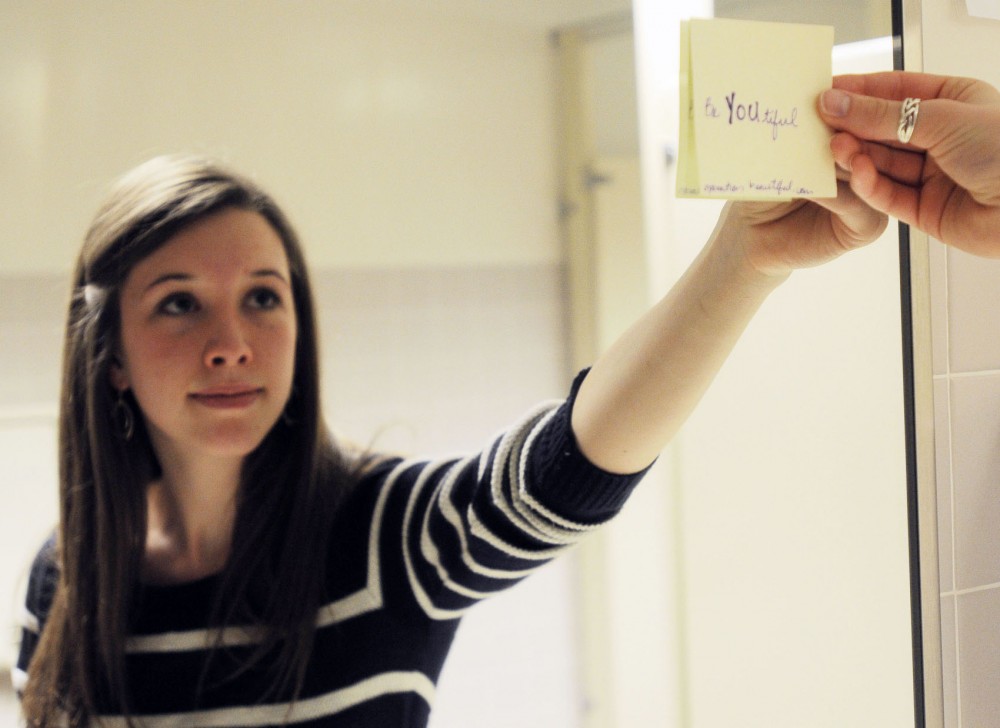“One pound: a measurement of weight. NOT a measurement of worth,” read a sticky note hanging in Coffman Union on Thursday.
“Maybe it’ll even make someone’s day,” said Elizabeth Pike, a nutrition senior and member of the Student Nutrition Advocacy Collaborative, which hung the notes as part of Operation Beautiful.
SNAC is one of several student groups that held events during National Eating Disorders Awareness Week last week.
The Emily Program, which provides eating disorder treatment, is hosting an exhibit focused on eating disorders at Art Institutes International Minnesota through March 14.
Each piece shares the artists’ experiences with their own eating disorders or those of loved ones, according to Emily Program Community Outreach Coordinator Keri Clifton.
“We hope to really change the conversations about what eating disorders are, who they impact,” Clifton said, “We just don’t talk about it enough.”
Mackenzie Koeck, a graduate student, used her handprint as the starting point for her painting.
“Our hands are tools to care and comfort, communicate, express emotion and really connect with other human beings,” she said.
Koeck participated in art therapy for two years while in residential treatment for anorexia through the Emily Program. She continues outpatient treatment today.
She said the stigma associated with eating disorders inspired her to paint.
“Any opportunity to dispel some of the myths or any chance to build awareness I see as a great gift and my responsibility to take,” Koeck said.
Art helps health care professional Martha Bird reinforce what she learns in therapy.
Bird has undergone treatment for compulsive overeating and restrictive dieting at the Emily Program since 2007.
Her mixed-media piece “Dancing Tree Woman” depicts a woman dancing, but instead of feet, she has tree roots, Bird said.
“Dancing is very grounding, in the present; I’m happy, and I feel good,” Bird said, adding that she now takes dance classes three to four days a week.
Eating disorders have the highest mortality rate of any mental illness, according to the National Association of Anorexia Nervosa and Associated Disorders.
Student group Active Minds, which raises awareness of mental disorders, dedicated its meeting Tuesday to eating disorders.
English and psychology senior Rachel Eckes began treatment in her senior year of high school and continues to do outpatient treatment at the Emily Program.
“It’s not something you can fix or heal overnight — it takes a while,” she said.
Eckes shared her experience with an audience for the first time Tuesday and said the experience was therapeutic.
Eating disorders are not gender- or age-specific, she said.
“I know some guys with eating disorders,” Eckes said. “I have really good friends in their 60s with eating disorders.”
Active Minds Secretary Erin McDonald, a psychology junior, spoke about supporting her mother, who is in treatment for anorexia.
Communication and empathy are important for supporting someone with an eating disorder, she said.
Middlebrook Hall health advocate Korrina Griffith said it’s important to talk about eating disorders and other mental health issues in dorms.
The “Freshman 15” and other myths related to health can cause stress, said Griffith, a gender, women and sexuality studies freshman.
Health advocates are trained through Boynton Health Service. They can refer students to mental health services or a nutritionist at Boynton, Griffith said.
Although Boynton Health Service did not host any events for National Eating Disorders Awareness Week this year, group therapy, mental health care, medical care and nutrition assessments are available.
“It’s really important that people struggling don’t feel alone and can get help,” Pike said.











